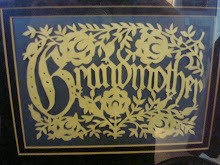Rationing
While the men were off fighting, the women took care of things at home. A lot of them got jobs in the factories doing things no one thought a woman could do. They built air planes, tanks, ammunition, dug ditches, or anything else a man usually did. It was liberating for a lot of women who had always been told what to do, first by their fathers, then by their husbands. It let women know they didn't necessairly need a man to take care of them. A lot men didn't like the 'new women' their wives had become because now they had a harder time bossing them around.
Everything manufactured during this time was for the war, & civilians (the ones not in the service) were issued coupons for various things. For instance, you got a coupon for 2 pairs of shoes a year. That was ok for adults, but children who had growing feet, or needed special shoes, had to depend on the kindness of their families. The adults would give their precious coupons to the family who had small & special needs children. So some adults went through the whole war without buying new shoes.
You couldn't buy a new car or household appliance without getting a special dispensation. Some times a permit to buy such was an item was given away as a prize, in movie theaters, or organizaions. (You only got the permit to buy one, but then you had to purchase it yourself, so no free-bee there) Gasoline was also rationed. Any spare gas was needed for tanks, military vehicles, ships, planes, etc. If you wanted to take a special trip, even a few miles away, you saved your gas coupons. So you walked, took a bus, rode your bike, or anyother type of transportation. Farmers were given special allotments so they could keep on farming. After all, you had to feed the boys overseas.
Coffee was hard to get (coffee beans don't grow in the U S). If you were a regular shopper at a family owned grocery, they would save their coffee to sell to their regular customers. (It would be hidden behind the counter). We were lucky enough to be one of those special customers at a local grocery (not a chain store). Sugar was hard to get, but available if you did your own canning & jelly making.. I often wonder if coffee my mother made came from a habit to save it during the 40's. Her coffee always tasted different, for years, & we couldn't figure out how she made it. After all, she used common brands. But Dale found out, she would make a fresh pot of coffee & it would taste fine. Then whatever was left in the pot, grounds & all, & the next day she would just add a few fresh grounds & some more water and reperk it. The next day, she did the same thing. It wouldn't take too many days for her coffee to taste like nothing you've ever tasted before. That's carrying economy a bit too far.
Bananas were scarce, along with other foreign grown fruits. Most merchant ships were turned into troop transports, or for whatever else they needed them for. Many people complained because they thought all this rationing deprived them of what they thought they needed. But in no way did the home folks suffer as much as the military personnel.
In the 8th grade we had an English teacher, who kept everyone in her classes up to date via news papers. We heard all the horror stories the Germans were doing to prisoners of war, or political prisoners, the gas chambers, concentration camps, medical experiments, etc.
First of all, they decided the jews should be wiped out because they weren't part of the "superior" race (meaning blond, german, arians) Someone decided they were the enemy. They arrested all the jews they could find & eventually shipped them to the concentration camps in box cars, like cattle. Young, old, babies, they all had to be destroyed. A few were fortunate enough to slip out of the country & hide. Some hid for many years, only to be captured & sent to the camps. (The Anne Frank family is probably the most famous case) Some evil doctors did experiments on prisoners. One was known to take the skin off a person & try to make a lampshade out of it. Another doctor tied a woman's legs together who was about to give birth, to see how long it would take for the woman or baby to die. Sam, you are 12 years old & I'm sure you can feel the horror of reading this, but this was one of many, many reasons why the americans fought so hard to defeat the germans. We could not have a world run by this type of people.
Of course, the germans did 'exterminate' millions by sending them to the gas chambers. A prisoner could be told he was going to the showers, but would not know if it would be a shower of water, or a shower of gas. After the war ended large piles of bones were found dumped into single pits, but before they died they looked like a skeleton covered with skin. Some were saved by the rescuerers & brought back to reasonable health. (read 'the diaries of Anne Frank')
More tomorrow
Subscribe to:
Post Comments (Atom)


1 comment:
Makes our lives look pretty easy, doesn't it?
Post a Comment